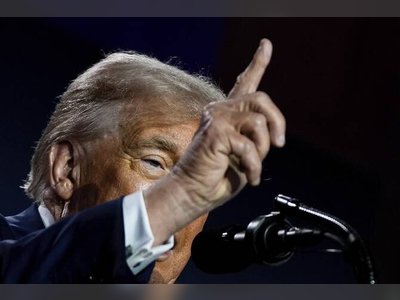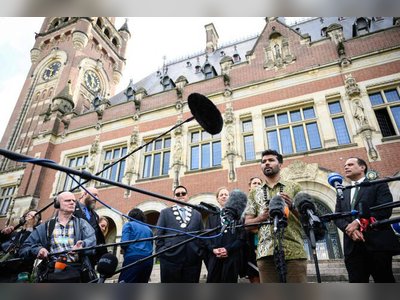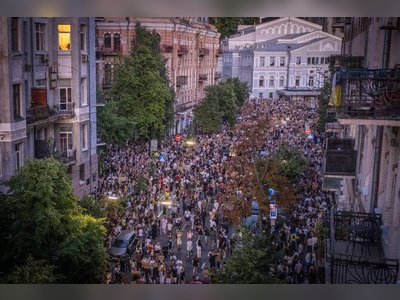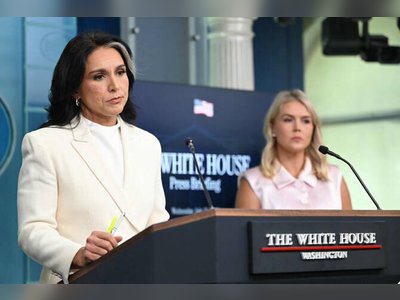
Ukraine Faces Protests Over Zelensky's Controversial Anti-Corruption Legislation
Critics argue that new law undermines the independence of Ukraine's anti-corruption bodies, sparking both domestic and international backlash.
President Volodymyr Zelensky has recently signed a bill into law that has been met with widespread criticism from both domestic protestors and international allies.
The legislation grants increased control to the prosecutor general over the National Anti-Corruption Bureau (Nabu) and the Specialised Anti-Corruption Prosecutor's Office (Sapo), raising concerns about the potential undermining of these agencies' independence.
Critics argue that this move could weaken Ukraine's fight against corruption and potentially open the door for renewed authoritarian tendencies in the country, at a time when the nation is still reeling from ongoing conflict with Russia.
In response to Zelensky's decision, hundreds of protestors took to the streets in Kyiv, as well as other major cities such as Lviv, Dnipro, and Odesa.
Demonstrators expressed deep concern over the implications of this legislation on Ukraine's democratic future, echoing sentiments from both sides of the political spectrum.
Zelensky himself attempted to defend the decision, stating that the agencies would continue to operate effectively but needed to be purged of 'Russian influence'.
This stance has been met with skepticism by many critics who point to a history of anti-corruption efforts and democratic struggles in Ukraine.
The new law also enables the Ukrainian prosecutor general to reassign or close corruption probes, sparking further controversy.
Critics argue that this change could undermine years of work aimed at rooting out systemic corruption within the government.
This sentiment is shared by Ukraine's Western allies who have provided significant financial support to the country on the condition that it makes progress in areas such as transparency and democratic governance.
The European Union and other international organizations have expressed concern over these recent developments.
The EU, which has been a key supporter of Ukraine's efforts to join the organization, stated its worry about the potential dismantling of the anti-corruption institutions' independence.
This concern is amplified given that curbing corruption is a major requirement for Ukraine's bid to join the EU.
Despite the international pressure and protests within the country, Ukrainian officials maintain that the core functions of the anti-corruption agencies remain intact.
However, many observers remain skeptical about the long-term implications of this decision on the nation's democratic trajectory.
The legislation grants increased control to the prosecutor general over the National Anti-Corruption Bureau (Nabu) and the Specialised Anti-Corruption Prosecutor's Office (Sapo), raising concerns about the potential undermining of these agencies' independence.
Critics argue that this move could weaken Ukraine's fight against corruption and potentially open the door for renewed authoritarian tendencies in the country, at a time when the nation is still reeling from ongoing conflict with Russia.
In response to Zelensky's decision, hundreds of protestors took to the streets in Kyiv, as well as other major cities such as Lviv, Dnipro, and Odesa.
Demonstrators expressed deep concern over the implications of this legislation on Ukraine's democratic future, echoing sentiments from both sides of the political spectrum.
Zelensky himself attempted to defend the decision, stating that the agencies would continue to operate effectively but needed to be purged of 'Russian influence'.
This stance has been met with skepticism by many critics who point to a history of anti-corruption efforts and democratic struggles in Ukraine.
The new law also enables the Ukrainian prosecutor general to reassign or close corruption probes, sparking further controversy.
Critics argue that this change could undermine years of work aimed at rooting out systemic corruption within the government.
This sentiment is shared by Ukraine's Western allies who have provided significant financial support to the country on the condition that it makes progress in areas such as transparency and democratic governance.
The European Union and other international organizations have expressed concern over these recent developments.
The EU, which has been a key supporter of Ukraine's efforts to join the organization, stated its worry about the potential dismantling of the anti-corruption institutions' independence.
This concern is amplified given that curbing corruption is a major requirement for Ukraine's bid to join the EU.
Despite the international pressure and protests within the country, Ukrainian officials maintain that the core functions of the anti-corruption agencies remain intact.
However, many observers remain skeptical about the long-term implications of this decision on the nation's democratic trajectory.











